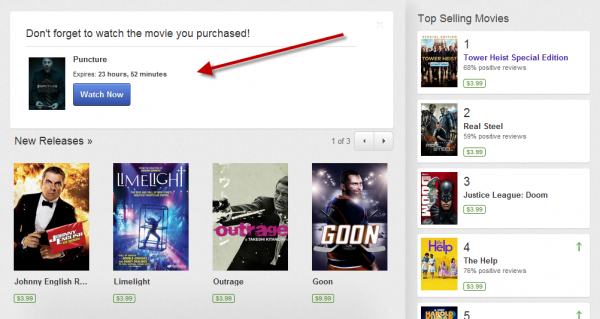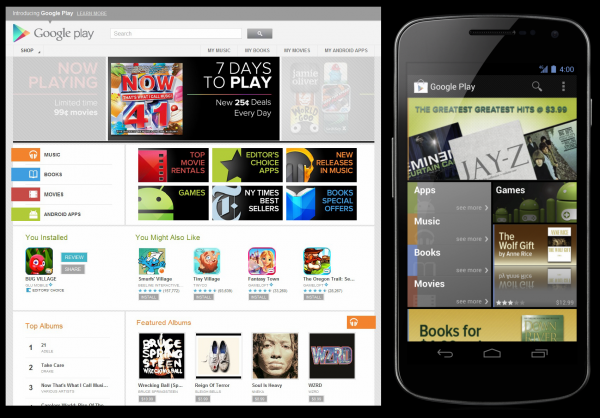Android Market Becomes “Google Play,” Reflects Google’s Multiplatform Content Aims
Android Market is dead. Long live Google Play! Today, Google announced that it is changing the name of its Android Market to Google Play, a move it hopes better reflects that the marketplace now offers more than apps, with content like books, video and music available even to those who aren’t using Android. “This is […]
 Android Market is dead. Long live Google Play! Today, Google announced that it is changing the name of its Android Market to Google Play, a move it hopes better reflects that the marketplace now offers more than apps, with content like books, video and music available even to those who aren’t using Android.
Android Market is dead. Long live Google Play! Today, Google announced that it is changing the name of its Android Market to Google Play, a move it hopes better reflects that the marketplace now offers more than apps, with content like books, video and music available even to those who aren’t using Android.
“This is really an acknowledgement that these experiences are relevant not just for a mobile environment but across the web,” said Jamie Rosenberg, Google’s director of digital content.
Google’s March To Selling Content
Over the past year or so, Google has been ramping up how it sells content directly to consumers. The Google eBookstore launched in December 2010. YouTube movie rentals were offered last May. Google Music began selling songs last November.
None of these services were Android-specific, yet the Android Market slowly became a common storefront where this type of content could be purchased. The Android Market was given a facelift last July to better reflect that content beyond apps could be purchased. But that still implied that the content there was only available for Android devices.
Given this, the change to “Google Play” makes a lot of sense. It immediately communicates that content within Play isn’t for Android-only. That makes it a better storefront for those who are seeking an alternative to buying similar content from better known places like Apple’s iTunes Store or Amazon’s, well, Amazon. I’ll cover that further below. But first, the changes.
The New Look
Beginning today, Android Market changes its name to Google Play. This happens now on the web; on Android devices, the change will happen over the coming days, for those with Android 2.2 or higher (below that, Android Market stays Android Market). Here’s a look at the new branding on both the web and Android:
Google doesn’t sell content in all countries, so here’s the rundown on what Google Play will offer depending on where you are:
- US: Apps, Movies, Books, Music
- UK & Canada: Apps, Movies, Books
- Australia: Apps & Books
- Japan: Apps & Movies
- Others: Apps
Here it is by content type:
- Apps: US, UK, Canada, Australia, Japan and many other countries (not all countries can buy apps)
- Books: US, UK, Canada, Australia
- Movies: US, UK, Canada, Japan
- Music: US
Google says it plans to roll as much content as it can around the world, though there’s no announcements today about what will come to where.
Google Music, Google eBookstore Part Of Play
The change also means that the services of Google Music and Google eBookstore become part of Google Play. YouTube video rentals, interestingly, do not.
The Google Music logo has now been retired; if you go to the Google Music site, it now reflects Google Play branding. Otherwise, all your content should appear as it did before. Mine does.
Similarly, Google eBookstore now redirects over to the books area at Google Play. It’s still listed as “Google eBookstore” on the Google Books home page, but I suspect that will change shortly.
YouTube is different. The YouTube rentals area says nothing about Google Play. It seems all the same movies you can rent at Google Play are also offered within YouTube, just without the Google Play branding. A movie I purchased through Google Play also shows up in the YouTube area, but with no indication of how I initially purchased it:

After following up with Google about this, it seems there are no plans for any of this to change at YouTube. It will continue to have its own branded area, even thought the content is the same as with Google Play.
On Android devices, things are more straight-forward. The apps will all change as shown below:

To recap:
- Android Market = Play Store
- Google Music = Play Music
- Video App = Play Movies
- Google Books = Play Books
Of course, the big question in all of this as Google more formalizes its content aspirations is whether the push will cause conflicts with its Google search engine. When people seek content using Google search, will they be directed to buy from Google over companies like Amazon or Apple?
“Nothing changes the way results of products from Google Play would surface in Google search,” Rosenberg told me. Google Play isn’t supposed to get any preferential treatment, he said.
Another thing I wondered was whether the “Play” name would resonate with those who were seeking non-game apps. With iOS, the App Store stands independent on devices like the iPad or the iPhone from iTunes. If people are seeking apps on their Android devices, will they really know that “Play Store” is where to look?
“We’re doing a lot to message to consumers that this transition is happening,” Rosenberg said, adding that the new name “creates a much wider funnel” and “is more in line with what consumers have come to expect from the platforms they’re aligned with.”
Positioning Against Apple & Amazon
I wonder if the change will cause Apple and Amazon to consider some repositioning. Apple’s content is primarily designed to be viewed only through Apple devices or Apple software. If you want to watch that movie, or read that book, you won’t be doing so unless you’re using an Apple iPhone, an iPad or iTunes, to my understanding. Songs are more transportable, but you’ll be buying them through iTunes.
In contrast, Amazon is an amazing marketplace of not caring how you consume your content. I can read my books through the Kindle apps I run on my Mac, my Windows PC, my Android phone, my iPhone, my Android tablet, my iPad — as well as on actual dedicated Kindle devices I own, such as the Kindle Fire. I’ve listened to music I’ve purchased through Amazon via the web on my iPod, Android phone and iPhone. I’ve watched movies I’ve purchased through my PC, Kindle Fire and Roku.
If Amazon has a weakness, I’d say it’s that there’s no unified apps-books-movies-music storefront that both Apple and now Google have. Amazon sells everything, and its music area is separate from its video area, which is separate again from books.
Perhaps we’ll see Amazon go the Google route and launch something like “Amazon Play,” to better allow it to compete if Google’s new name catches on. As for Apple, it would take a real leap to see the company decide to open up its content to be more multiplatform. The lock to Apple devices and software helps it ensure a better user experience plus helps keep generating the cash from all those devices it sells.
The Google Tablet & Extending Google’s Brand
That leads to a rumor that Google will launch its own tablet called the Google Play. Google wouldn’t comment on the name, and the rumored name now seems likely caused by confusion between the name of the Google Play marketplace leaking out.
Google executive chairman Eric Schmidt did say in December that Google plans its own branded tablet to be released in six months, similar to its “Nexus” line of phones. When that arrives, Google Play could make the tablet seem more Kindle Fire-like with a unified content purchasing and consumption experience. However, Google Play may already do that now as it rolls out to existing tablets.
Finally, the change might also help Google in a world where there are any number of “Android Markets.”
Amazon is perhaps the best example. Its Amazon Appstore For Android, with a free app each day, is a compelling offering for Android users. That store also means that Amazon can keep things off its Android-powered Kindle Fire device that it doesn’t want.
However, if people are used to having “Google Play” content on the web or on their phone, they might demand access to that more than they might complain about not being able to reach a generic sounding “Android Market.”
Learning More & The “7 Days To Play” Promotion
You can learn more about Google Play on its About page here, as well as in this Google blog post or through its new Google+ page. The company has also made a video about it:
[youtube width=”560″ height=”315″]https://www.youtube.com/watch?v=GdZxbmEHW7M[/youtube]
As part of the launch, Google’s also going to offer a different app, book, video rental or album at low prices. The book “Extremely Loud & Incredibly Close” is being sold for $0.25 today, for example. The special sales will last for seven days, as part of a “7 Days To Play” promotion.
For yet more, see related coverage from others around the web about Google Play here on Techmeme. Below are some background articles about some of the things mentioned in this story.
Related Articles
- Going Head-To-Head With Amazon, Google Launches eBooks
- YouTube Declares Intention To Compete In On-Demand Movie Rentals
- Google Takes On iTunes, Amazon With New Music Store
- Google Launches Streaming Movies & Music
- New Android Market Better, Offers Movie Rentals
- The Kindle Fire Is A Kindle-Killer, Not An iPad Killer — That’s Why It Works
Contributing authors are invited to create content for MarTech and are chosen for their expertise and contribution to the martech community. Our contributors work under the oversight of the editorial staff and contributions are checked for quality and relevance to our readers. MarTech is owned by Semrush. Contributor was not asked to make any direct or indirect mentions of Semrush. The opinions they express are their own.
Related stories
New on MarTech
